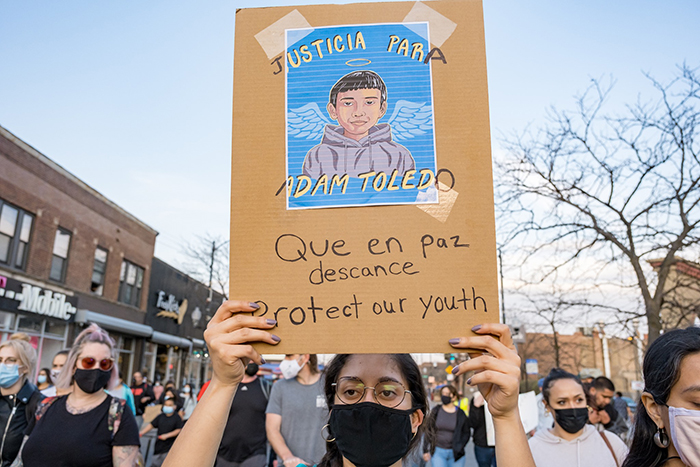
PHOTO / SARAH-JI RHEE
“[M]y blood was boiling … seeing men, women and children fired upon, people who were not armed, fired upon by policemen.”
Those words sound as current as today’s news. In fact, August Spies, a leader of Chicago’s working class, spoke them in a Chicago courtroom in 1886. He and six co-defendants were being framed – falsely accused of murder. They had been singled out because they had dared to oppose police brutality and had helped organize a nationwide strike on May 1, 1886.
The framing of Spies and his co-defendants set off a chain of events which ultimately led to May 1 being celebrated as May Day. But while May Day began in part because of the strike for the eight-hour day on May 1, 1886, it also has deep roots in the fight against killer cops.
Killer cops in Chicago
When August Spies told the court that his blood “was boiling,” it was because of what he had seen firsthand. On May 3, 1886, cops attacked workers at the McCormick Reaper factory, killing at least two strikers. Outraged, Spies and other labor leaders composed a flyer calling for a rally to “denounce the latest atrocious act of the police” — to be held the next day at Haymarket Square.
As that peaceful rally was ending, 176 cops moved in to halt it. Then someone threw a bomb, killing one policeman. The cops began firing wildly. In the days that followed, the police unleashed a reign of terror, arresting and even torturing militant workers.
August Spies and seven other labor leaders were charged with being accessories to murder and with a general conspiracy to murder. Most had not even been present when the bomb was thrown.
Tried before a biased judge and jury, the defendants were convicted. Seven were sentenced to hang. (An eighth, Oscar Neebe, was sentenced to 15 years at hard labor.)
Albert Parsons, George Engel, Adolph Fischer, and August Spies were hanged in November 1887.
On July 14, 1889 – the 100th anniversary of the storming of the Bastille – the International Labor Congress in Paris adopted a proposal to declare the first of May to be International Labor Day and a day to remember the “Martyrs of Chicago.”
Today, as police killings of the impoverished and the marginalized – especially Black and Brown workers – intensify, truly honoring the Haymarket martyrs means demanding justice for all those cut down by police violence, including the most recent victims – whether they died on picket lines, outside convenience stores, or in neighborhoods. We should never forget that in March 2021 a Chicago cop killed 13-year-old Adam Toledo just a few blocks west of where cops killed McCormick Reaper strikers in May 1886.
This year, let’s demand that the killer cops of today be held accountable. The Haymarket martyrs understood full well that murdering cops serve the interests of the exploiters. They were committed to uniting workers of all ethnicities to wrest control of society from those exploiters. Perhaps the true spirit of May Day can be summed up best in the words of Haymarket defendant Oscar Neebe. The last words of his autobiography read simply: “I call on all workingmen or working women of all nationalities and all countries to unite and down with your oppressors.”
Chris Mahin is a writer, speaker and teacher on contemporary U.S. politics and history, particularly on the significance of the American Revolutionary War and Civil war eras for today. He is the Electoral Desk on the People’s Tribune Editorial Board.
